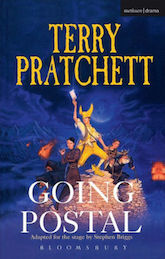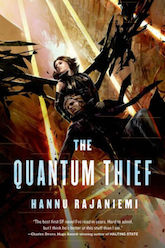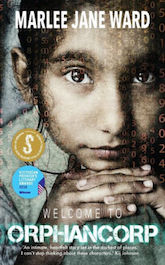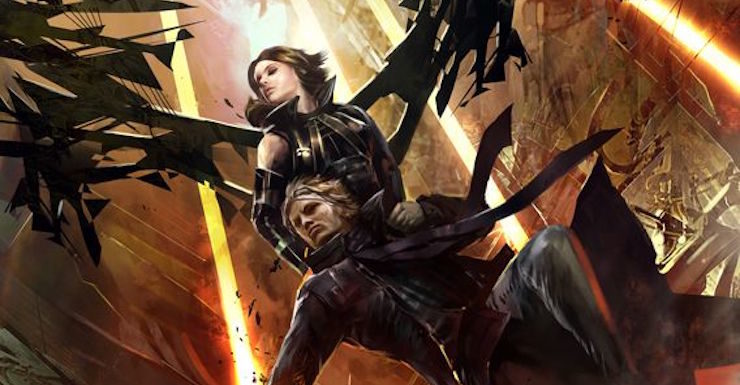Countless times in fiction we’ve seen heroes pull off daring heists, avenge the deaths of loved ones, and vanquish colossal foes (whilst causing considerable collateral damage), but what might happen if they didn’t get away with it? What does it look like in science fiction and fantasy when a character finds themselves behind bars, whether literal or only figurative? Here are five books that explore that very question.
Camp Concentration, Thomas Disch
 You could be excused for thinking that the title of Thomas Disch’s 1968 novel is a simple play on the term ‘concentration camp,’ but delve into the book and you’ll find it’s not as simple as that. Locked up at a subterranean prison called Camp Archimedes, Louis Sacchetti is tasked with monitoring an experimental program whereby inmates are infected with a strain of syphilis designed to break down mental walls and provide genius-level intellect. Similar to Kurt Vonnegut’s Mother Night, Camp Concentration uses the device of journal entries to tell its story, but where Vonnegut’s novel follows a free man who many consider a war criminal, Camp Concentration is the story of a writer imprisoned as a conscientious objector to an unpopular war.
You could be excused for thinking that the title of Thomas Disch’s 1968 novel is a simple play on the term ‘concentration camp,’ but delve into the book and you’ll find it’s not as simple as that. Locked up at a subterranean prison called Camp Archimedes, Louis Sacchetti is tasked with monitoring an experimental program whereby inmates are infected with a strain of syphilis designed to break down mental walls and provide genius-level intellect. Similar to Kurt Vonnegut’s Mother Night, Camp Concentration uses the device of journal entries to tell its story, but where Vonnegut’s novel follows a free man who many consider a war criminal, Camp Concentration is the story of a writer imprisoned as a conscientious objector to an unpopular war.
While much of Sacchetti’s journal chronicles his efforts to hold onto his sense of self while in prison, he also details the actions and aspirations of the other prisoners, and even the staff of Camp Archimedes. Some of the prisoners use their newly-gifted intelligence to re-examine alchemical theories abandoned centuries earlier, but their objectives seem to pale in comparison to one of the warders whose goal is nothing less than the destruction of the entire human race.
It’s a dryly and darkly funny book, filled with references to Dante’s Inferno, Faust, the Bible, the operas of Wagner, and much more, with the pomp and prestige of these works standing juxtaposed against the depressing grimness of the prison’s underground setting.
Going Postal, Terry Pratchett
 Can a person be imprisoned by their job? I think many of us would say yes, particularly if you were overseen by a relentless golem parole officer, and if the only alternative was death.
Can a person be imprisoned by their job? I think many of us would say yes, particularly if you were overseen by a relentless golem parole officer, and if the only alternative was death.
Terry Pratchett’s Going Postal opens with the infamous con man, forger, and all around petty criminal Moist von Lipwig on death row, desperately trying to scrape his way to freedom using a spoon. Alas, the spoon represents only the prospect of escape, and Moist soon finds himself at the business end of a hangman’s rope – but the Patrician, Havelock Vetinari, has other plans.
You see, Moist has a completely forgettable face, and despite a long criminal career and a very public (near-)hanging, nobody in the entire city can recognise the master of disguise. So what better to do with an unrepentant criminal than set him loose amongst the unrepentant criminals of big business? Overseen by the golem Mr. Pump, Moist is given the job of bringing the region’s disused postal service back from the dead, a job that puts him right in the crosshairs of Reacher Gilt—a businessman and con artist of such skill that Moist can’t help but respect him.
In Going Postal, the late Terry Pratchett shows once again why he was the master of not just comedy, but also of character, plotting, and intrigue.
Bitch Planet, Kelly Sue DeConnick, Valentine De Landro
 Bitch Planet is the story of a group of women caught in an off-world prison, in a setting that’s part far-flung future, part misogynistic past, and part all-too-recognisable present. In the world of Bitch Planet women are second-class citizens, and any woman who refuses to bend and scrape to male authority figures—whether that’s a husband, father, or the Fathers who run the patriarchal society—will find themselves marked as Non-Compliant. These women living on Bitch Planet are kept out of sight and out of mind, left to toil and die, more valuable as players of the death sport known as Megaton than as free members of society. Only on the playing field is their anger and violence allowed to be exhibited—and even then only so these tough, capable women can be used as an example for any other women that might dare challenge the status quo.
Bitch Planet is the story of a group of women caught in an off-world prison, in a setting that’s part far-flung future, part misogynistic past, and part all-too-recognisable present. In the world of Bitch Planet women are second-class citizens, and any woman who refuses to bend and scrape to male authority figures—whether that’s a husband, father, or the Fathers who run the patriarchal society—will find themselves marked as Non-Compliant. These women living on Bitch Planet are kept out of sight and out of mind, left to toil and die, more valuable as players of the death sport known as Megaton than as free members of society. Only on the playing field is their anger and violence allowed to be exhibited—and even then only so these tough, capable women can be used as an example for any other women that might dare challenge the status quo.
It’s a timely comic—sadly so—and Valentine De Landro’s art is clean and bold, using bright colours and Ben-Day dots to anchor it in the (often sexist) history of comics. Kelly Sue DeConnick’s skills as a writer are clearly on display here as she explores the lives of these women and brings both the prison and external society to life. With the dialogue of many of the men in Bitch Planet, she shows how it’s possible to be sexist without being crude, deftly holding up a mirror to our society and showing just how insidious misogyny can be.
The Quantum Thief, Hannu Rajaniemi
 Trapped by Archons in the Dilemma Prison, Jean le Flambeur—the famous thief and raconteur—is faced again and again with variations of the prisoner’s dilemma, pitted against other criminals and other versions of himself in an endlessly iterative attempt at rehabilitation through game theory.
Trapped by Archons in the Dilemma Prison, Jean le Flambeur—the famous thief and raconteur—is faced again and again with variations of the prisoner’s dilemma, pitted against other criminals and other versions of himself in an endlessly iterative attempt at rehabilitation through game theory.
The original prisoner’s dilemma involves interrogating two prisoners, where if both prisoners stay quiet, they will both get a one year sentence, if one prisoner betrays the other (who remains quiet) they would go free at the expense of a worse sentence for the other prisoner, or where both prisoners betraying the other winds them both with a two year sentence. But when you run an infinitely iterative prison, things do tend to get boring, so simple interrogations are replaced by pistol-packing duels, games of chicken on an endless highway, or trench warfare. No matter the scenario there are always two choices: self-interest and betrayal, or cooperation.
When we first meet Flambeur, he’s not feeling too cooperative—and for his attempted betrayal of a fellow prisoner he’s treated to a bullet through the skull, rendered painfully, utterly real…until the whole dilemma is reset once again.
If all this sounds weird and deep and interesting (and the above is just the beginning—only the first few pages of the novel) then I’ve done a decent job of explaining it—if not, all blame should lie with the author of this article, and not with Hannu Rajaniemi, whose debut novel The Quantum Thief is an utterly unique slab of post-cyberpunk intrigue.
Welcome to Orphancorp, by Marlee Jane Ward*
 In fiction, orphanages are rarely—if ever—shown to be warm, welcoming environments. They’re home to hurt and hurtful children, damaged by their abandonment, left to lash out at one another for lack of any better pastime or any better target. But what happens if you took those broken children and placed them into an orphanage that was run like a for-profit prison, where every child had to work to pay their way through their imprisonment, where the caretakers are more like prison guards, and where the whole system has been set up to institutionalise the children, setting them on a path that would likely lead them to an actual prison?
In fiction, orphanages are rarely—if ever—shown to be warm, welcoming environments. They’re home to hurt and hurtful children, damaged by their abandonment, left to lash out at one another for lack of any better pastime or any better target. But what happens if you took those broken children and placed them into an orphanage that was run like a for-profit prison, where every child had to work to pay their way through their imprisonment, where the caretakers are more like prison guards, and where the whole system has been set up to institutionalise the children, setting them on a path that would likely lead them to an actual prison?
Well, then you’d have the U.S. penal system. Sorry, I meant: Well, then you’d have Marlee Jane Ward’s fantastic novella, Welcome to Orphancorp.
Mirii Mahoney is a week away from her eighteenth birthday, and thus a week away from aging out of the corporate prison system and finally tasting freedom. All she needs to do is stay out of trouble for seven days, but the whole system is stacked against her, and Mirii is terrible at keeping her nose clean, particularly when one of her friends needs help.
Welcome to Orphancorp is a big story packed into a small book, with a unique voice, subtle world-building, and a whole lot of heart.
*Full disclosure: Marlee Jane Ward happens to be my partner, but given that the book has won a couple of awards and has been shortlisted for several others, I’m clearly not the only one who thinks it’s great.
 Corey J. White is a writer of science fiction, horror, and other, harder-to-define stories. He studied writing at Griffith University and is now based in Melbourne, Australia. Killing Gravity and its sequel, Void Black Shadow, are available from Tor.com Publishing. Find him at coreyjwhite.com and on Twitter at @cjwhite.
Corey J. White is a writer of science fiction, horror, and other, harder-to-define stories. He studied writing at Griffith University and is now based in Melbourne, Australia. Killing Gravity and its sequel, Void Black Shadow, are available from Tor.com Publishing. Find him at coreyjwhite.com and on Twitter at @cjwhite.











What comes to my mind, is Raul Endymion’s prison in Dan Simmons’ Endymion and The Rise of Endymion. Security provided by Schrödinger…
.
Can’t believe you didn’t include the Gouffre Martel, from Alfred Bester’s The Stars My Destination. How do you imprison criminals in a society where everyone can teleport anywhere on Earth, as long as they can picture their relative position in space to their goal? Put them in a complex cave system and never let them have any light.
In film two come to mind.
Star Trek the Undiscovered country, Kirk and McCoy get stuck in Klingon Rura Penthe
The Chronicles of Riddick, Riddick gets stuck in Crematoria
The physics of it don’t quite work, but the Great Wheel of Kharnabar – some millennia a prison, some millennia a monastery – from Helliconia Winter is a hell of an image.
I’m in the middle of The Quantum Thief right now and I’d say Corey’s description of the Dilemma Prison is about as spot-on as it can be for such a ferociously mind-boggling book.
I’d put two of my very favorite YA novels, Incarceron and Sapphique by Catherine Fisher on this list. If sentient, vaguely Arthurian steampunk prisons that shapeshift and are traversed by honest-to-god Jesus robots are your thing, you’ll be all set.
And @sdzald if we’re talking movies, Dark City. Truly spectacular ambience.
One of my favourites actually comes from the early Star Wars novel Han Solo at Star’s End by Brian Daley. Less a prison than a storage facility, inmates at Star’s End are kept in stasis and only revived for interrogation (until Han & Chewie memorably ruin everything).
THE SUPERNATURALIST by Eoin Colfer. Young adult science fiction. In the future, the main character is in an orphanage where children are lab rats for testing chemicals, personal products, and just about anything else. If he survives that, he’ll be sold in slavery. Lovely place.
It’s TV, not books, but the episode of RED DWARF where the main characters find a Karma prison where the attacker literally feels what the victim does. A funny and painful episode.
The Republic of Haven prison on the planet named Hades, nicknamed Hell, in the Honor Harrington series. Relies on prison camps scattered all over a continent in a hot, equatorial climate. No need for prison guards – just drop supplies and let the prisoners distribute them among themselves. The suppliers are calculated not to last sufficiently far for the prisoners to go anywhere. Also, there is an attack on the drop ship, they just “forget” to visit the area on the next supply run.
In fantasy, there is Azkaban, of course.
In the new Deadpool 2 movie, you get to see the Icebox facility.
Garrus 9 from the IDW Transformers series, it is what you get when you have a maximum security prison for war criminals, who all live for millions of years and can literally have their souls (“sparks”) extracted and stored separate from their body if necessary, and then manage to takeover the complex and flip the script on the wardens. Ain’t nobody getting out of that nightmare prison with their sanity intact.
Reading the title, I was instantly reminded of Mishmar, Roland’s tower-prison in Ilona Andrews’ Kate Daniels series. NOT a place one would like to end up.
And yes, as RobMRobM @8 said, Azkaban comes to mind.
Salusa Secudus from Dune was cool, as was New York from Escape From New York.
No mention of the Hell planet from the Honor Harrington books? Or the Pit of Despair from The Princess Bride?
Of course, there’s also Demolition Man, but then again, that one’s probably forgettable.
Dante’s Inferno?
@8: Sorry for skimming over, I see someone did mention Haven’s prison after all. It’s a brutal entry in the series (although Honor did get to wear a nifty eye patch afterward).
Huh, thinking about it, I guess the Death Star could count as a prison to, though that’s not its primary purpose.
Brandon Sanderson’s Elantris is the first example that jumped to mind, as soon as I read the title on this post.
The Dilgar homeworld from Babylon Five, intended as a prison for their entire race for getting too warlike, after they were driven back there and deprived of their spaceships. It didn’t last long though, because someone went and messed with their local star and it went nova shortly afterwards.
Coventry by Heinlein comes to mind.
Provenance has Compassionate Removal that sounds an awful lot like Hades.
I’d swear there are more out there as well.
Then we have Open Prison by James White in which an an entire world is used as a POW camp, with of course an escape committee and a breakout (did it work?)
The Cetagandan prison camp in Bujold’s Borders of Infinity.
Not a physical prison – the characters are taken out of actual prison very early on – but in The Clocktaur War duology by T. Kingfisher (aka Ursula Vernon), the former prisoners are kept on-task on their probably-suicide mission by carnivorous tattoos that start chomping if the possessor strays from the job.
As I recollect, the Sten series by Allan Cole and Chris Bunch started with a book where the protagonist was in some sort of prison. I need to dig that one out. While I don’t remember the details, I did enjoy that series.
Alan, I remember that one as well. Revenge of the Damned from when Sten and Alex fought the Tahn. A lot of WW II POW tropes broken out and used there.
No mention of Dragnipur from Malazan? That was the first thing that jumped to my mind. As a prison, that is definitely up there as one of the worst places you could ever end up.
The Avatar the Last Airbender series also had some interesting prisons. Short version is that various people in this world can manipulate (“Bend”) one of the four classical elements of Air, Earth, Fire, and Water using martial arts. And there’s a war on (and it’s a kids show) so they’ve had to deal with the question of ” how do you imprison people who can just move rock out of the way or conjure a thermal lance and cut their way out and so on?”
They came up with some interesting solutions, largely defined around depriving the people with this magic of the material they can manipulate or restraining them from moving so they can’t do the necessary martial arts moves to make things work.
Lois McMaster Bujold’s Miles Vorkosigan gets himself thrown into prison in The Borders of Infinity. The prison is a half-kilometer-wide force field dome. No guards, food bars drop in so the prisoners fight over them, and all the prisoners are naked, and the one prisoner he’s been sent to get dies. One of my favorite short stories ever.
Anomander Rake’s Dragnipur (Steven Erikson, Malazan), Merlin’s prison in the Chronicles of Amber and the prison in Brent Weeks’ Lightbringer series are stuck in my mind as quite memorable…
Reading @WuseMajor’s comment, I suddenly realized we’ve forgotten all about the Phantom Zone of Superman lore, a rather unique and awful prison. It’s had a long-shelf, spanning the comics, the Reeves films, and the new Supergirl show. If we’re talking comics, there’s also Arkham Asylum (let’s be honest, it’s really a prison) and Belle Reve prison (introduced to me through the excellent Young Justice jail break episode), and Marvel’s Negative Zone. Of course, comics prisons notoriously easy to break out of, with Arkham having the worst revolving door.
Cordwainer Smith, “A Planet Called Shayol.”
Chthon and Phthor by Piers Anthony were unforgettable prisons
One of my favorite Prison’s was from a book I read in the 60’s. Tom Godwin’s book “The Survivors” The entire world of Ragnarok is the prison of a colony ship from earth stranded by the bad guys – an alien race called the Gorns…
“Infinity Hold” by Barry B. Longyear – drop the criminals on a desert planet, and then forget about them. (It has two sequels that I only just found out about, wonder if they’re as good?)
Kundershaden Prison, Orgoreyn, Gethen.
Abandon all hope, and don’t be male or female if you go.
The Village from the The Prisoner TV show is probably the most iconic and awesome scifi prison in my mind. It’s just a friendly seaside village somewhere in the British Isles, which is actually a machine of psychological torture and interrogation.
Be seeing you.
Wusemajor @24 and Michelle @27 remind me of the prison for Magneto in “X-Men”, that had nothing metallic in reach.
While YA it is still fantasy. Catherine Fischer has a book called Incarceron where the whole prison is (in essence) alive.
Brilliant book!!
Max Gladstone’s Penitents in Full Fathom Five are one of the most affecting imprisonments I’ve read, in the way the prison system and the prisoner interact. I really appreciate the exploration of the idea behind them in the book, and the differing perspectives on whether they’re right or wrong, good or evil, and better or worse than alternatives.
As traditional prisons go, the sky cells in A Song of Ice and Fire are pretty distinctive. The Wiki of Ice and Fire describes them thusly:
“The sky cells are the Eyrie‘s dungeons. They are particularly infamous; they are merely shelves on the side of the mountain’s sheer cliffs, left open to the cold sky. […] The Arryns keep the only dungeon in the Seven Kingdoms where the prisoners are welcome to escape at will – by jumping to their deaths. Many prisoners, driven mad by the cold and howling wind, commit suicide rather than remain imprisoned. It is cold in the sky cells with the wind screaming night and day, but the only bedding is a thin blanket. The floor slopes slightly, unnerving prisoners. A cell is miserably small; five feet away, where a wall would be in a proper dungeon, the floor ends and sky begins.”
Other castles in ASOIAF have their own varieties of horrible dungeon — ice cells, lightless black cells, “oubliettes that fit a man as tight as a suit of armor,” etc.
Samuel R. Delany’s “Brass” is another goody.
“No one has ever escaped the dungeons of Aquila. The people accept this as a historical fact.”
(Lady Hawke)
i also feel a mention should be made of Azkaban – on an island, attended by soul-sucking demons who make you relive all your worst memories all the time. No thanks.
I can’t remember the name of the book – anyone? Science fiction, and the entire world is a prisoner of war camp; the (human) prisoners plan to escape by constructing a fake crashed (enemy) spaceship and, when the guards land from orbit to investigate, seizing the guards’ ship. Only to discover that the war’s been over for years…
@40: James White’s The Escape Orbit (AKA Open Prison)?
Seconding that weird rainbow prison from the Lightbringer books (seriously, that is messed up), thirding Dragnipur .
Forgot about Gutaria, that place was effective & creepy!
http://riyria.wikia.com/wiki/Gutaria
In Despicable Me 2, the Minions are imprisoned at a lovely resort with spiffy rides and drinks with fruit and umbrellas in them. They never think about escaping. Then in Despicable Me 3, the Minions are imprisoned in a regular prison, and end up taking over, due to their implacable loyalty to each other (they escape when they discover Boss is in trouble).
It’s not the prisons’ fault that they’re revolving doors in comics. In comics, death is a revolving door. Everything in comics becomes a revolving door when the writers alternate between wanting to impress the readers by taking that cool character permanently out of play,and wanting to please the readers by putting that cool character back into play.
@45: Very true. When people started complaining that Coulson’s post-Avengers resurrection was some sort of aberration or turning point, I sort of shrugged and thought, Took them this long? It’s actually impressive how many people in the MCU actually remain deceased.
Back to prisons, though; even by comics standards, some of them like Arkham are just plain ridiculous. I can’t imagine what the employee turnover is there, or how much they have to pay to get any guards. Political corruption has to be involved in keeping it open.
I think the problem with prisons in all fiction, not just comics, is that most of time they’re used as a temporary set piece. Either the hero is imprisoned, in which case that person must eventually escape, or a villain is, in which case popularity and the need for more story may dictate another escape. Rarely do we visit prison longer than a few scenes, or believe that escape is not possible. So, the prison is built up in the mind of the viewer/reader, but must eventually have a vulnerability to be exploited. Just like a villain who keeps coming back to fight the hero, prolonged exposure to a menace supposedly unstoppable that yet falls eventually defangs it.
Maybe the better question is: do any of the prisons mentioned ever have a person not escape? I don’t think we can demand 100% success; nothing built by human hands can ever be perfect. But somewhere that most inmates, the vast majority (say 90-95%) will have to serve their time regardless of their importance.
I should be fair and acknowledge it’s not just comics. The Count of Monte Cristo gets out, as does his descendant Gully Foyle; the Prisoner of Zenda is busted out; the Prisoner of Azkaban gets loose; Dufresne gets out of Shawshank, and so on. Lots of people escape in The Great Escape.
George Zebrowski, with his prison asteroids in Brute Orbits.
In Lloy Biggle Jr’s short story The Perfect Punishment, convicts are confined to a town where they live normal lives except for being required to repeat their crimes weekly, with the mostly android population of the town as victims. How could anything go wrong with such a perfect system?
Creepy and memorable.
I remember one story. A guy in a prison, he considers himself not guilty, same think his guards… But he is there because his implemented programs told him he committed a crime, but he didn’t. Can you please tell me the author and title? Thank you very much!